ICT710 Professional Practice: Cambridge Analytica Case Study Report
VerifiedAdded on 2023/03/20
|10
|2157
|35
Report
AI Summary
This report evaluates the Cambridge Analytica scandal, analyzing the ethical issues and professional practice failures of Facebook. Utilizing the Doing Ethics Technique (DET), the report identifies key ethical concerns arising from the data breach affecting over 87 million users. It assesses the case through the lens of the ACS Code of Ethics for ICT Professionals, determining violations of principles such as the Primacy of the Public Interest, Honesty, and Competence. The report applies ethical theories like Utilitarianism and Deontology to highlight the unethical nature of Facebook's actions. It concludes with recommendations, including changes to Facebook's privacy policies and obtaining explicit user consent for data collection, aiming to prevent future ethical lapses and protect user privacy. The report underscores the importance of ethical conduct in the ICT industry.
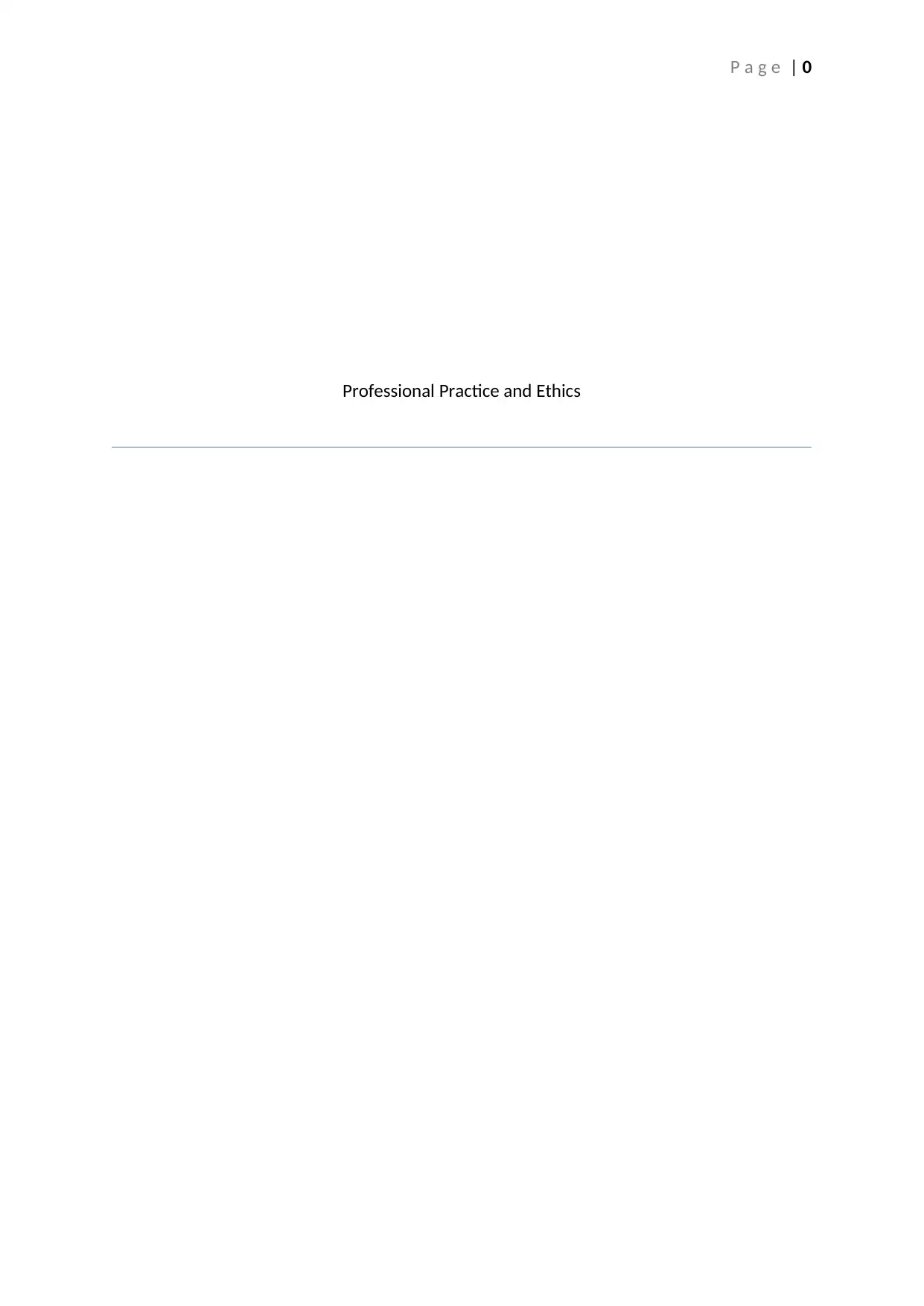
P a g e | 0
Professional Practice and Ethics
Professional Practice and Ethics
Paraphrase This Document
Need a fresh take? Get an instant paraphrase of this document with our AI Paraphraser
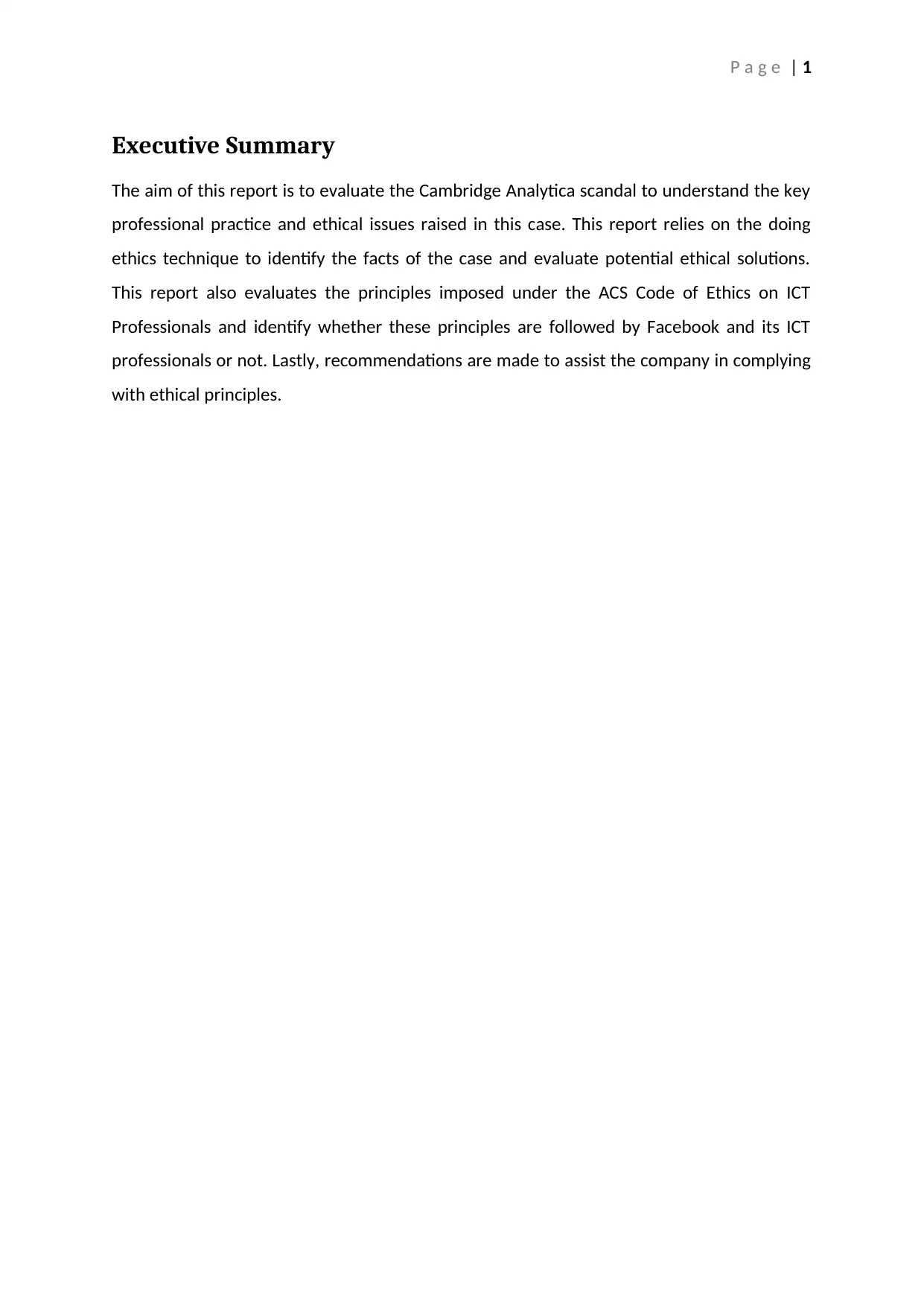
P a g e | 1
Executive Summary
The aim of this report is to evaluate the Cambridge Analytica scandal to understand the key
professional practice and ethical issues raised in this case. This report relies on the doing
ethics technique to identify the facts of the case and evaluate potential ethical solutions.
This report also evaluates the principles imposed under the ACS Code of Ethics on ICT
Professionals and identify whether these principles are followed by Facebook and its ICT
professionals or not. Lastly, recommendations are made to assist the company in complying
with ethical principles.
Executive Summary
The aim of this report is to evaluate the Cambridge Analytica scandal to understand the key
professional practice and ethical issues raised in this case. This report relies on the doing
ethics technique to identify the facts of the case and evaluate potential ethical solutions.
This report also evaluates the principles imposed under the ACS Code of Ethics on ICT
Professionals and identify whether these principles are followed by Facebook and its ICT
professionals or not. Lastly, recommendations are made to assist the company in complying
with ethical principles.
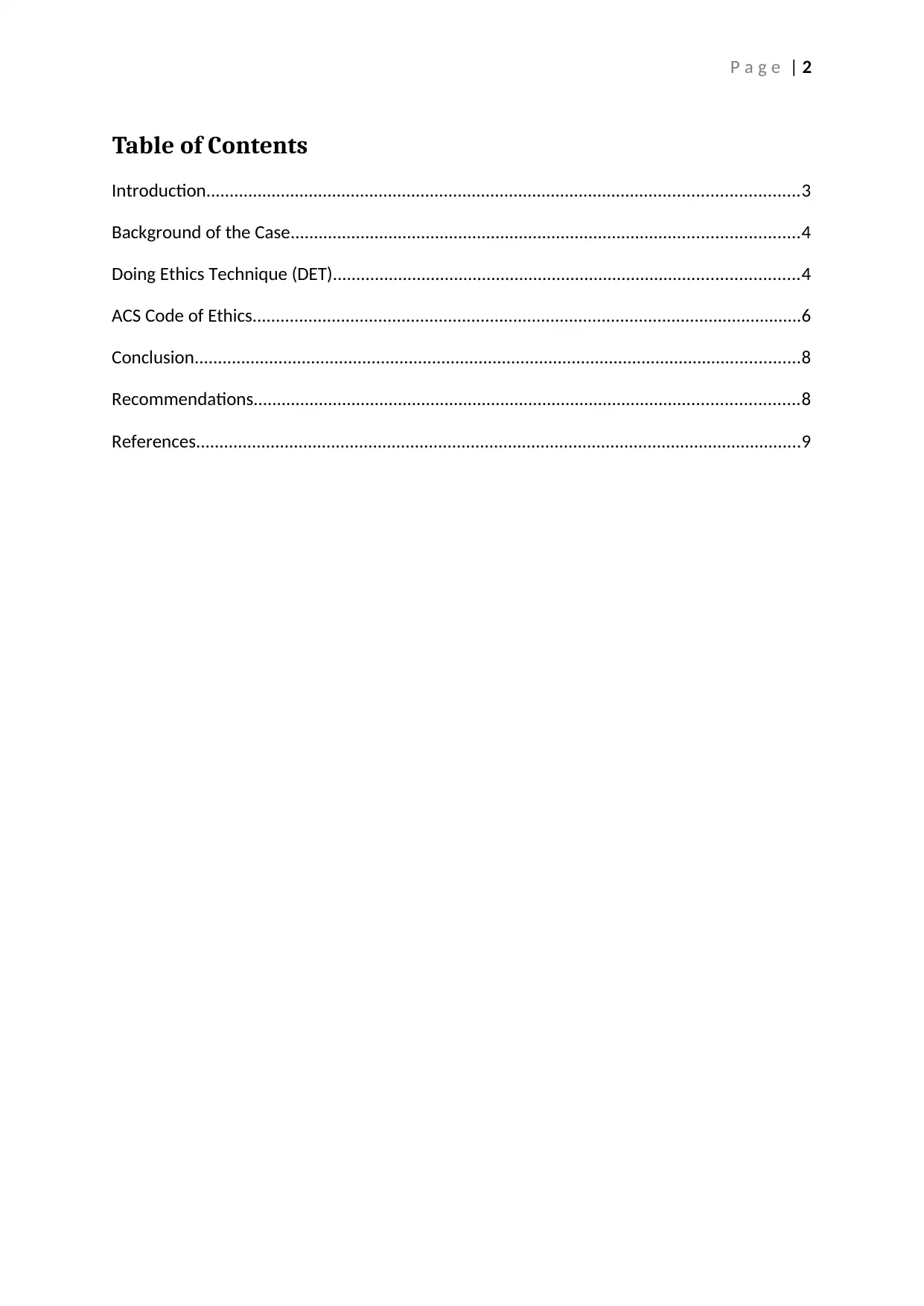
P a g e | 2
Table of Contents
Introduction...............................................................................................................................3
Background of the Case.............................................................................................................4
Doing Ethics Technique (DET)....................................................................................................4
ACS Code of Ethics......................................................................................................................6
Conclusion..................................................................................................................................8
Recommendations.....................................................................................................................8
References..................................................................................................................................9
Table of Contents
Introduction...............................................................................................................................3
Background of the Case.............................................................................................................4
Doing Ethics Technique (DET)....................................................................................................4
ACS Code of Ethics......................................................................................................................6
Conclusion..................................................................................................................................8
Recommendations.....................................................................................................................8
References..................................................................................................................................9
⊘ This is a preview!⊘
Do you want full access?
Subscribe today to unlock all pages.

Trusted by 1+ million students worldwide
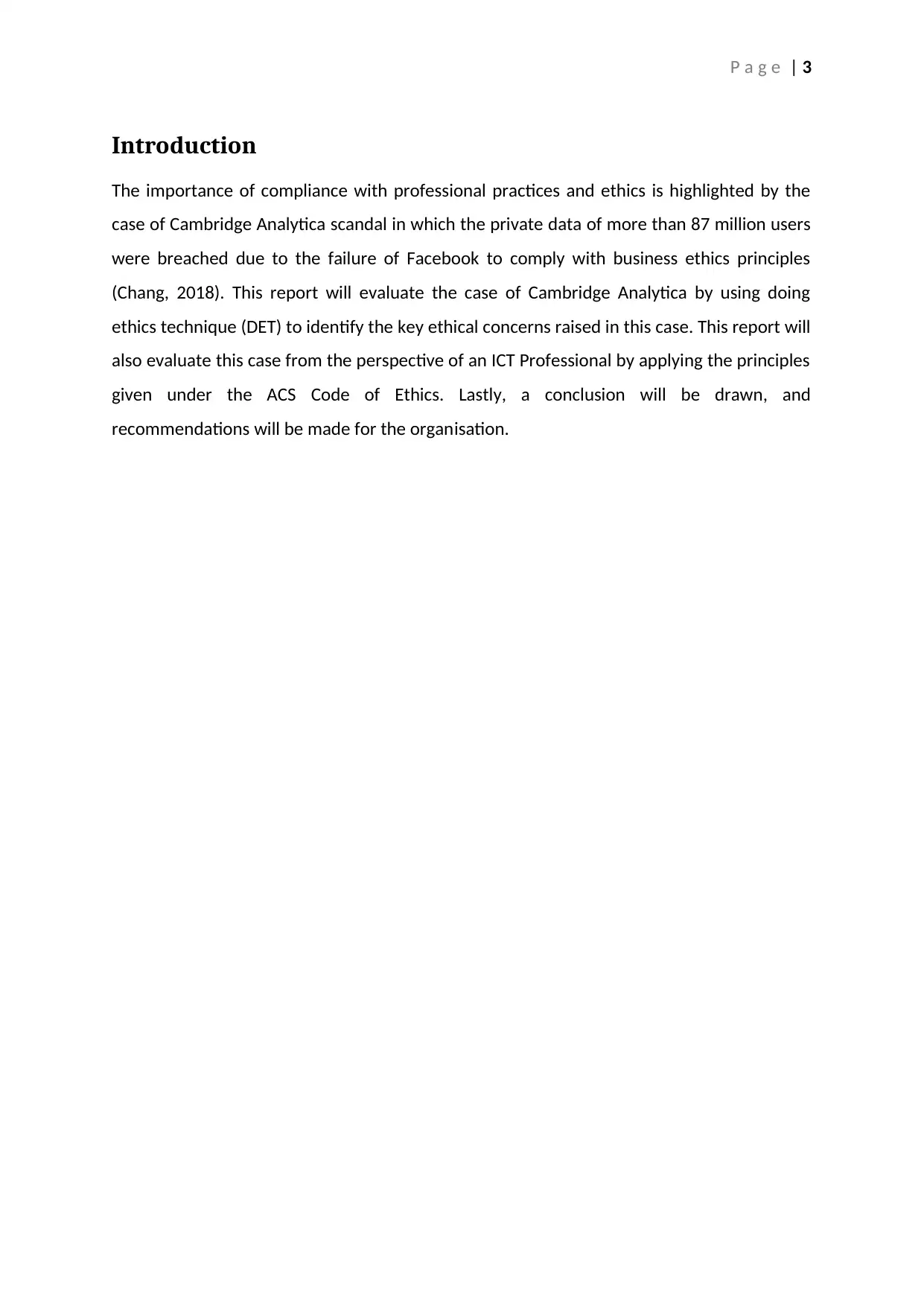
P a g e | 3
Introduction
The importance of compliance with professional practices and ethics is highlighted by the
case of Cambridge Analytica scandal in which the private data of more than 87 million users
were breached due to the failure of Facebook to comply with business ethics principles
(Chang, 2018). This report will evaluate the case of Cambridge Analytica by using doing
ethics technique (DET) to identify the key ethical concerns raised in this case. This report will
also evaluate this case from the perspective of an ICT Professional by applying the principles
given under the ACS Code of Ethics. Lastly, a conclusion will be drawn, and
recommendations will be made for the organisation.
Introduction
The importance of compliance with professional practices and ethics is highlighted by the
case of Cambridge Analytica scandal in which the private data of more than 87 million users
were breached due to the failure of Facebook to comply with business ethics principles
(Chang, 2018). This report will evaluate the case of Cambridge Analytica by using doing
ethics technique (DET) to identify the key ethical concerns raised in this case. This report will
also evaluate this case from the perspective of an ICT Professional by applying the principles
given under the ACS Code of Ethics. Lastly, a conclusion will be drawn, and
recommendations will be made for the organisation.
Paraphrase This Document
Need a fresh take? Get an instant paraphrase of this document with our AI Paraphraser
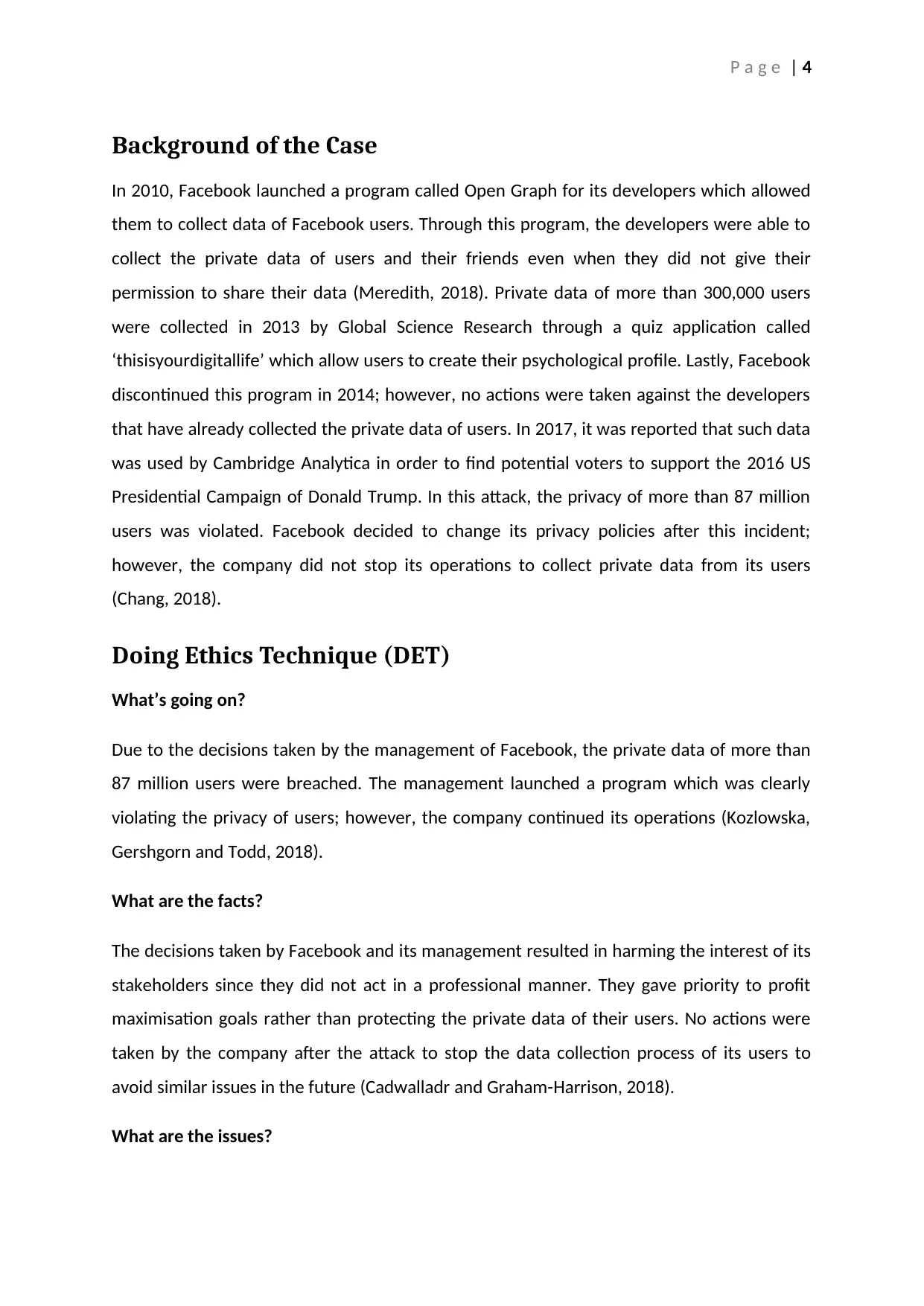
P a g e | 4
Background of the Case
In 2010, Facebook launched a program called Open Graph for its developers which allowed
them to collect data of Facebook users. Through this program, the developers were able to
collect the private data of users and their friends even when they did not give their
permission to share their data (Meredith, 2018). Private data of more than 300,000 users
were collected in 2013 by Global Science Research through a quiz application called
‘thisisyourdigitallife’ which allow users to create their psychological profile. Lastly, Facebook
discontinued this program in 2014; however, no actions were taken against the developers
that have already collected the private data of users. In 2017, it was reported that such data
was used by Cambridge Analytica in order to find potential voters to support the 2016 US
Presidential Campaign of Donald Trump. In this attack, the privacy of more than 87 million
users was violated. Facebook decided to change its privacy policies after this incident;
however, the company did not stop its operations to collect private data from its users
(Chang, 2018).
Doing Ethics Technique (DET)
What’s going on?
Due to the decisions taken by the management of Facebook, the private data of more than
87 million users were breached. The management launched a program which was clearly
violating the privacy of users; however, the company continued its operations (Kozlowska,
Gershgorn and Todd, 2018).
What are the facts?
The decisions taken by Facebook and its management resulted in harming the interest of its
stakeholders since they did not act in a professional manner. They gave priority to profit
maximisation goals rather than protecting the private data of their users. No actions were
taken by the company after the attack to stop the data collection process of its users to
avoid similar issues in the future (Cadwalladr and Graham-Harrison, 2018).
What are the issues?
Background of the Case
In 2010, Facebook launched a program called Open Graph for its developers which allowed
them to collect data of Facebook users. Through this program, the developers were able to
collect the private data of users and their friends even when they did not give their
permission to share their data (Meredith, 2018). Private data of more than 300,000 users
were collected in 2013 by Global Science Research through a quiz application called
‘thisisyourdigitallife’ which allow users to create their psychological profile. Lastly, Facebook
discontinued this program in 2014; however, no actions were taken against the developers
that have already collected the private data of users. In 2017, it was reported that such data
was used by Cambridge Analytica in order to find potential voters to support the 2016 US
Presidential Campaign of Donald Trump. In this attack, the privacy of more than 87 million
users was violated. Facebook decided to change its privacy policies after this incident;
however, the company did not stop its operations to collect private data from its users
(Chang, 2018).
Doing Ethics Technique (DET)
What’s going on?
Due to the decisions taken by the management of Facebook, the private data of more than
87 million users were breached. The management launched a program which was clearly
violating the privacy of users; however, the company continued its operations (Kozlowska,
Gershgorn and Todd, 2018).
What are the facts?
The decisions taken by Facebook and its management resulted in harming the interest of its
stakeholders since they did not act in a professional manner. They gave priority to profit
maximisation goals rather than protecting the private data of their users. No actions were
taken by the company after the attack to stop the data collection process of its users to
avoid similar issues in the future (Cadwalladr and Graham-Harrison, 2018).
What are the issues?
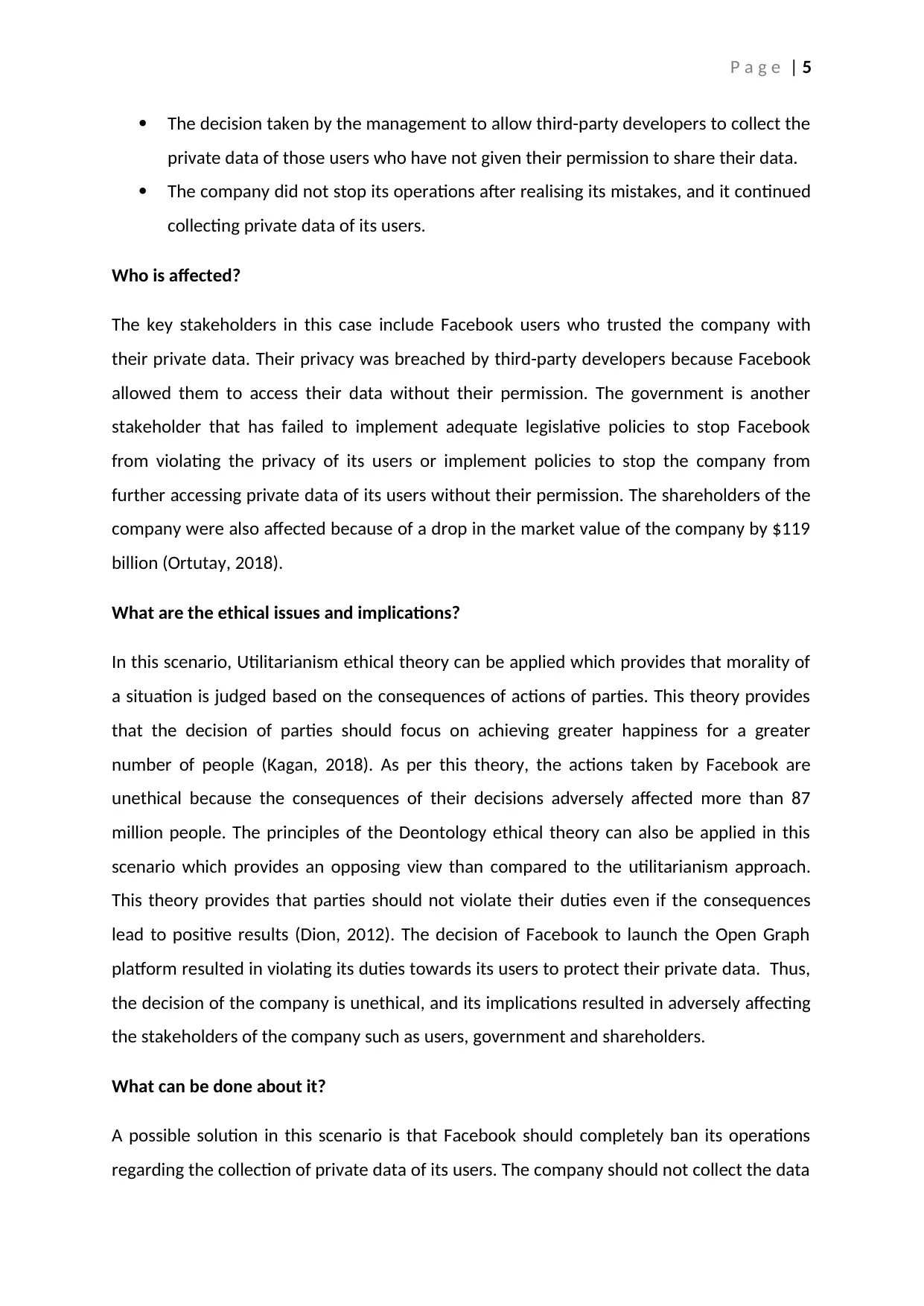
P a g e | 5
The decision taken by the management to allow third-party developers to collect the
private data of those users who have not given their permission to share their data.
The company did not stop its operations after realising its mistakes, and it continued
collecting private data of its users.
Who is affected?
The key stakeholders in this case include Facebook users who trusted the company with
their private data. Their privacy was breached by third-party developers because Facebook
allowed them to access their data without their permission. The government is another
stakeholder that has failed to implement adequate legislative policies to stop Facebook
from violating the privacy of its users or implement policies to stop the company from
further accessing private data of its users without their permission. The shareholders of the
company were also affected because of a drop in the market value of the company by $119
billion (Ortutay, 2018).
What are the ethical issues and implications?
In this scenario, Utilitarianism ethical theory can be applied which provides that morality of
a situation is judged based on the consequences of actions of parties. This theory provides
that the decision of parties should focus on achieving greater happiness for a greater
number of people (Kagan, 2018). As per this theory, the actions taken by Facebook are
unethical because the consequences of their decisions adversely affected more than 87
million people. The principles of the Deontology ethical theory can also be applied in this
scenario which provides an opposing view than compared to the utilitarianism approach.
This theory provides that parties should not violate their duties even if the consequences
lead to positive results (Dion, 2012). The decision of Facebook to launch the Open Graph
platform resulted in violating its duties towards its users to protect their private data. Thus,
the decision of the company is unethical, and its implications resulted in adversely affecting
the stakeholders of the company such as users, government and shareholders.
What can be done about it?
A possible solution in this scenario is that Facebook should completely ban its operations
regarding the collection of private data of its users. The company should not collect the data
The decision taken by the management to allow third-party developers to collect the
private data of those users who have not given their permission to share their data.
The company did not stop its operations after realising its mistakes, and it continued
collecting private data of its users.
Who is affected?
The key stakeholders in this case include Facebook users who trusted the company with
their private data. Their privacy was breached by third-party developers because Facebook
allowed them to access their data without their permission. The government is another
stakeholder that has failed to implement adequate legislative policies to stop Facebook
from violating the privacy of its users or implement policies to stop the company from
further accessing private data of its users without their permission. The shareholders of the
company were also affected because of a drop in the market value of the company by $119
billion (Ortutay, 2018).
What are the ethical issues and implications?
In this scenario, Utilitarianism ethical theory can be applied which provides that morality of
a situation is judged based on the consequences of actions of parties. This theory provides
that the decision of parties should focus on achieving greater happiness for a greater
number of people (Kagan, 2018). As per this theory, the actions taken by Facebook are
unethical because the consequences of their decisions adversely affected more than 87
million people. The principles of the Deontology ethical theory can also be applied in this
scenario which provides an opposing view than compared to the utilitarianism approach.
This theory provides that parties should not violate their duties even if the consequences
lead to positive results (Dion, 2012). The decision of Facebook to launch the Open Graph
platform resulted in violating its duties towards its users to protect their private data. Thus,
the decision of the company is unethical, and its implications resulted in adversely affecting
the stakeholders of the company such as users, government and shareholders.
What can be done about it?
A possible solution in this scenario is that Facebook should completely ban its operations
regarding the collection of private data of its users. The company should not collect the data
⊘ This is a preview!⊘
Do you want full access?
Subscribe today to unlock all pages.

Trusted by 1+ million students worldwide
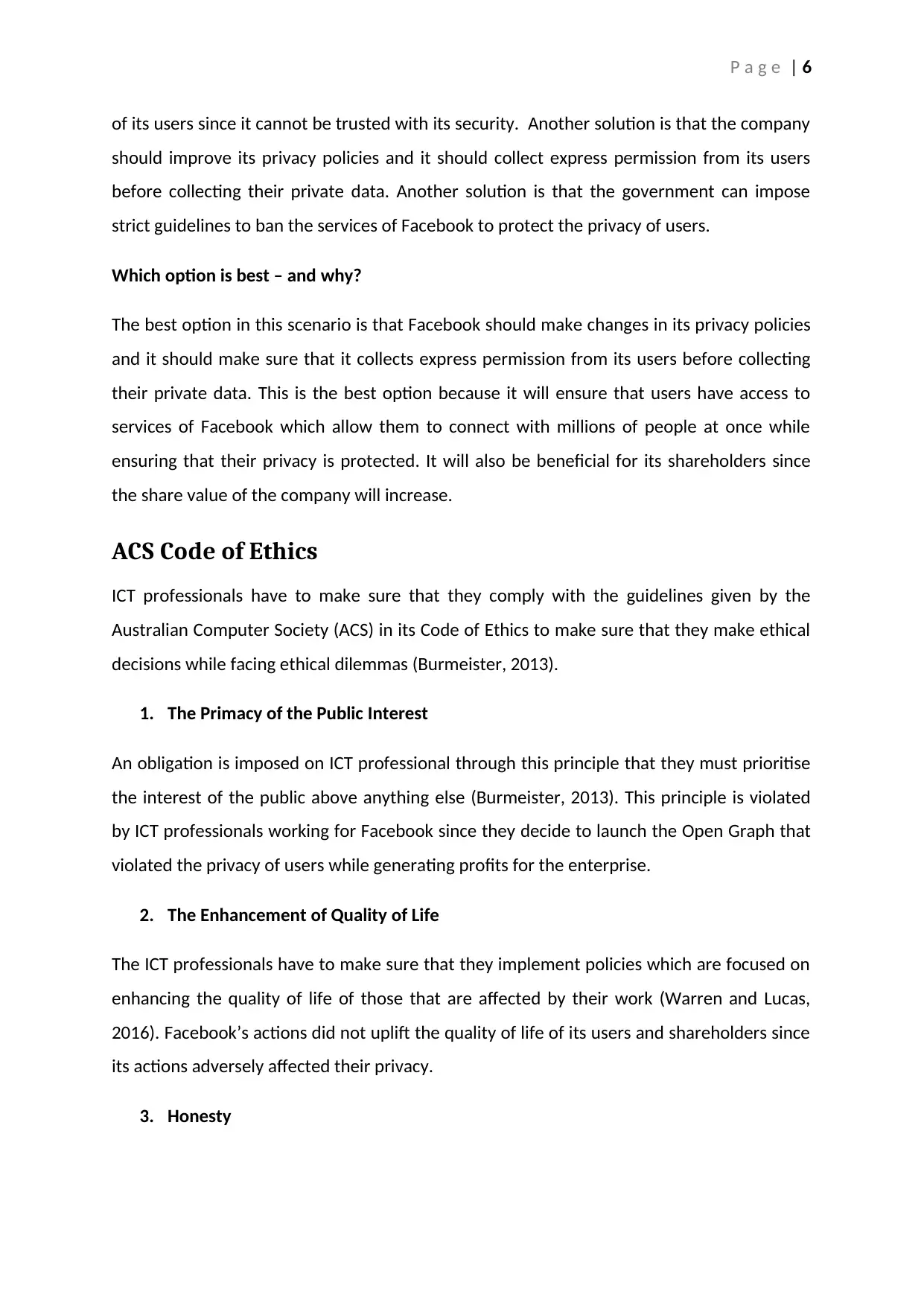
P a g e | 6
of its users since it cannot be trusted with its security. Another solution is that the company
should improve its privacy policies and it should collect express permission from its users
before collecting their private data. Another solution is that the government can impose
strict guidelines to ban the services of Facebook to protect the privacy of users.
Which option is best – and why?
The best option in this scenario is that Facebook should make changes in its privacy policies
and it should make sure that it collects express permission from its users before collecting
their private data. This is the best option because it will ensure that users have access to
services of Facebook which allow them to connect with millions of people at once while
ensuring that their privacy is protected. It will also be beneficial for its shareholders since
the share value of the company will increase.
ACS Code of Ethics
ICT professionals have to make sure that they comply with the guidelines given by the
Australian Computer Society (ACS) in its Code of Ethics to make sure that they make ethical
decisions while facing ethical dilemmas (Burmeister, 2013).
1. The Primacy of the Public Interest
An obligation is imposed on ICT professional through this principle that they must prioritise
the interest of the public above anything else (Burmeister, 2013). This principle is violated
by ICT professionals working for Facebook since they decide to launch the Open Graph that
violated the privacy of users while generating profits for the enterprise.
2. The Enhancement of Quality of Life
The ICT professionals have to make sure that they implement policies which are focused on
enhancing the quality of life of those that are affected by their work (Warren and Lucas,
2016). Facebook’s actions did not uplift the quality of life of its users and shareholders since
its actions adversely affected their privacy.
3. Honesty
of its users since it cannot be trusted with its security. Another solution is that the company
should improve its privacy policies and it should collect express permission from its users
before collecting their private data. Another solution is that the government can impose
strict guidelines to ban the services of Facebook to protect the privacy of users.
Which option is best – and why?
The best option in this scenario is that Facebook should make changes in its privacy policies
and it should make sure that it collects express permission from its users before collecting
their private data. This is the best option because it will ensure that users have access to
services of Facebook which allow them to connect with millions of people at once while
ensuring that their privacy is protected. It will also be beneficial for its shareholders since
the share value of the company will increase.
ACS Code of Ethics
ICT professionals have to make sure that they comply with the guidelines given by the
Australian Computer Society (ACS) in its Code of Ethics to make sure that they make ethical
decisions while facing ethical dilemmas (Burmeister, 2013).
1. The Primacy of the Public Interest
An obligation is imposed on ICT professional through this principle that they must prioritise
the interest of the public above anything else (Burmeister, 2013). This principle is violated
by ICT professionals working for Facebook since they decide to launch the Open Graph that
violated the privacy of users while generating profits for the enterprise.
2. The Enhancement of Quality of Life
The ICT professionals have to make sure that they implement policies which are focused on
enhancing the quality of life of those that are affected by their work (Warren and Lucas,
2016). Facebook’s actions did not uplift the quality of life of its users and shareholders since
its actions adversely affected their privacy.
3. Honesty
Paraphrase This Document
Need a fresh take? Get an instant paraphrase of this document with our AI Paraphraser
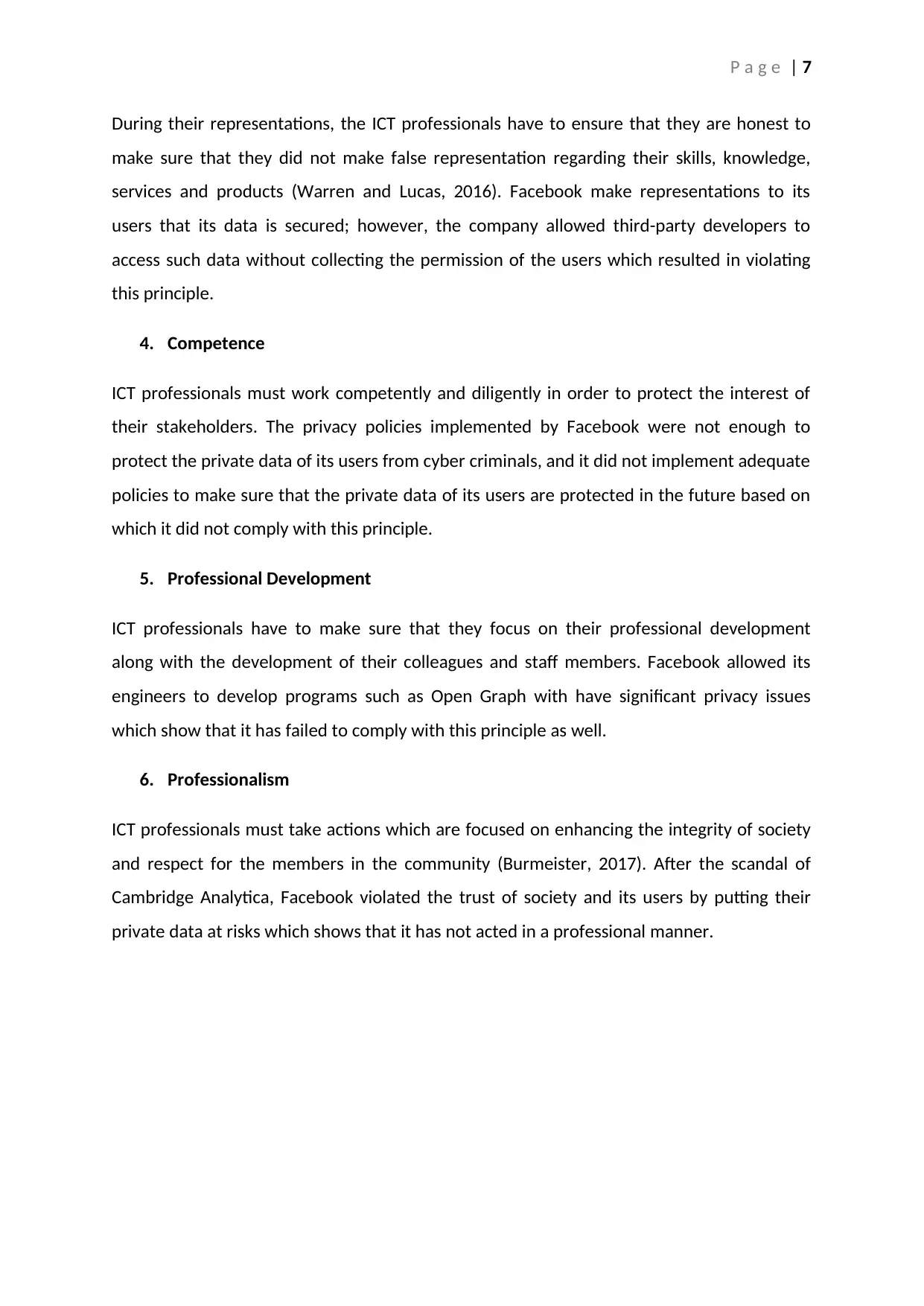
P a g e | 7
During their representations, the ICT professionals have to ensure that they are honest to
make sure that they did not make false representation regarding their skills, knowledge,
services and products (Warren and Lucas, 2016). Facebook make representations to its
users that its data is secured; however, the company allowed third-party developers to
access such data without collecting the permission of the users which resulted in violating
this principle.
4. Competence
ICT professionals must work competently and diligently in order to protect the interest of
their stakeholders. The privacy policies implemented by Facebook were not enough to
protect the private data of its users from cyber criminals, and it did not implement adequate
policies to make sure that the private data of its users are protected in the future based on
which it did not comply with this principle.
5. Professional Development
ICT professionals have to make sure that they focus on their professional development
along with the development of their colleagues and staff members. Facebook allowed its
engineers to develop programs such as Open Graph with have significant privacy issues
which show that it has failed to comply with this principle as well.
6. Professionalism
ICT professionals must take actions which are focused on enhancing the integrity of society
and respect for the members in the community (Burmeister, 2017). After the scandal of
Cambridge Analytica, Facebook violated the trust of society and its users by putting their
private data at risks which shows that it has not acted in a professional manner.
During their representations, the ICT professionals have to ensure that they are honest to
make sure that they did not make false representation regarding their skills, knowledge,
services and products (Warren and Lucas, 2016). Facebook make representations to its
users that its data is secured; however, the company allowed third-party developers to
access such data without collecting the permission of the users which resulted in violating
this principle.
4. Competence
ICT professionals must work competently and diligently in order to protect the interest of
their stakeholders. The privacy policies implemented by Facebook were not enough to
protect the private data of its users from cyber criminals, and it did not implement adequate
policies to make sure that the private data of its users are protected in the future based on
which it did not comply with this principle.
5. Professional Development
ICT professionals have to make sure that they focus on their professional development
along with the development of their colleagues and staff members. Facebook allowed its
engineers to develop programs such as Open Graph with have significant privacy issues
which show that it has failed to comply with this principle as well.
6. Professionalism
ICT professionals must take actions which are focused on enhancing the integrity of society
and respect for the members in the community (Burmeister, 2017). After the scandal of
Cambridge Analytica, Facebook violated the trust of society and its users by putting their
private data at risks which shows that it has not acted in a professional manner.
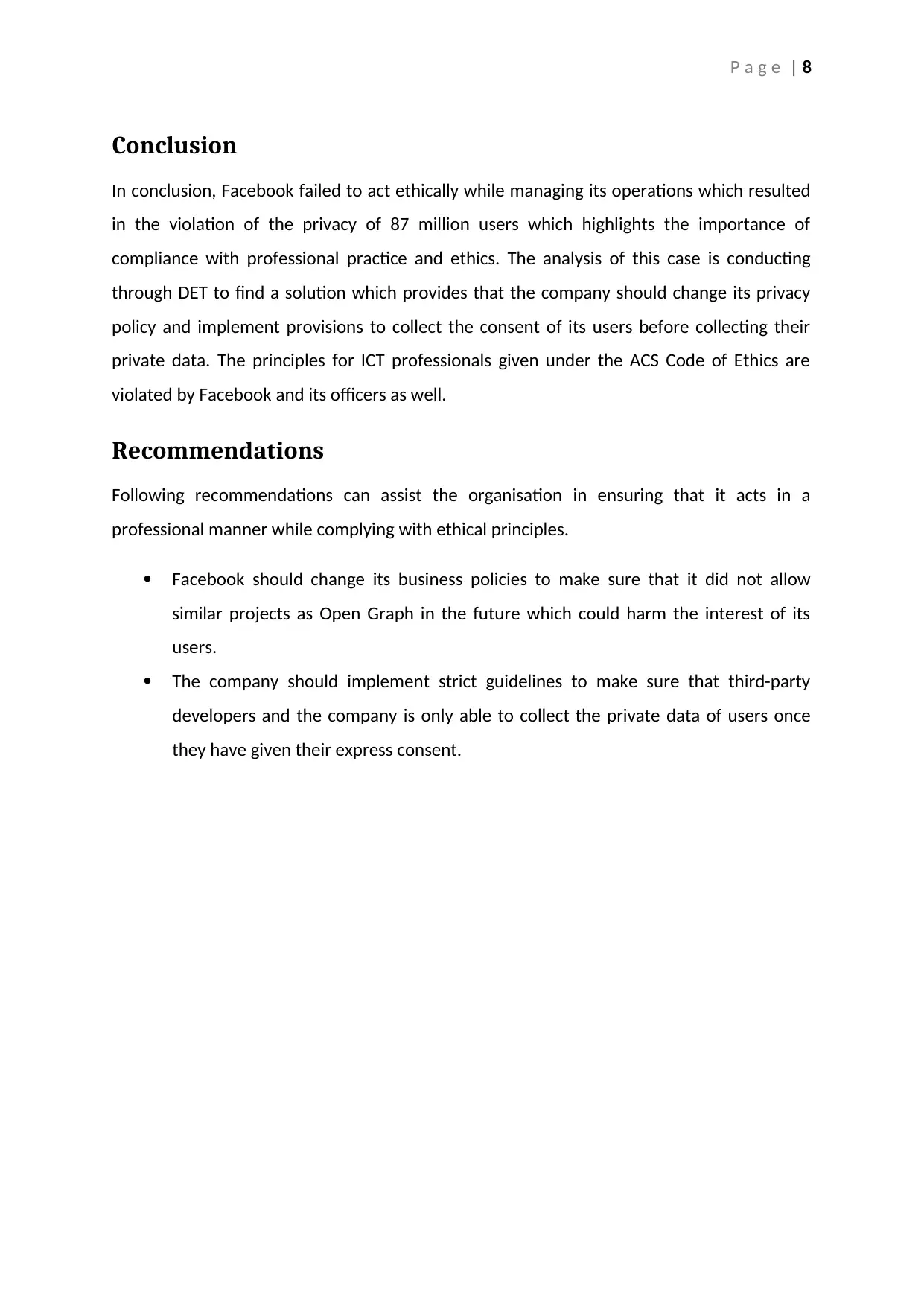
P a g e | 8
Conclusion
In conclusion, Facebook failed to act ethically while managing its operations which resulted
in the violation of the privacy of 87 million users which highlights the importance of
compliance with professional practice and ethics. The analysis of this case is conducting
through DET to find a solution which provides that the company should change its privacy
policy and implement provisions to collect the consent of its users before collecting their
private data. The principles for ICT professionals given under the ACS Code of Ethics are
violated by Facebook and its officers as well.
Recommendations
Following recommendations can assist the organisation in ensuring that it acts in a
professional manner while complying with ethical principles.
Facebook should change its business policies to make sure that it did not allow
similar projects as Open Graph in the future which could harm the interest of its
users.
The company should implement strict guidelines to make sure that third-party
developers and the company is only able to collect the private data of users once
they have given their express consent.
Conclusion
In conclusion, Facebook failed to act ethically while managing its operations which resulted
in the violation of the privacy of 87 million users which highlights the importance of
compliance with professional practice and ethics. The analysis of this case is conducting
through DET to find a solution which provides that the company should change its privacy
policy and implement provisions to collect the consent of its users before collecting their
private data. The principles for ICT professionals given under the ACS Code of Ethics are
violated by Facebook and its officers as well.
Recommendations
Following recommendations can assist the organisation in ensuring that it acts in a
professional manner while complying with ethical principles.
Facebook should change its business policies to make sure that it did not allow
similar projects as Open Graph in the future which could harm the interest of its
users.
The company should implement strict guidelines to make sure that third-party
developers and the company is only able to collect the private data of users once
they have given their express consent.
⊘ This is a preview!⊘
Do you want full access?
Subscribe today to unlock all pages.

Trusted by 1+ million students worldwide
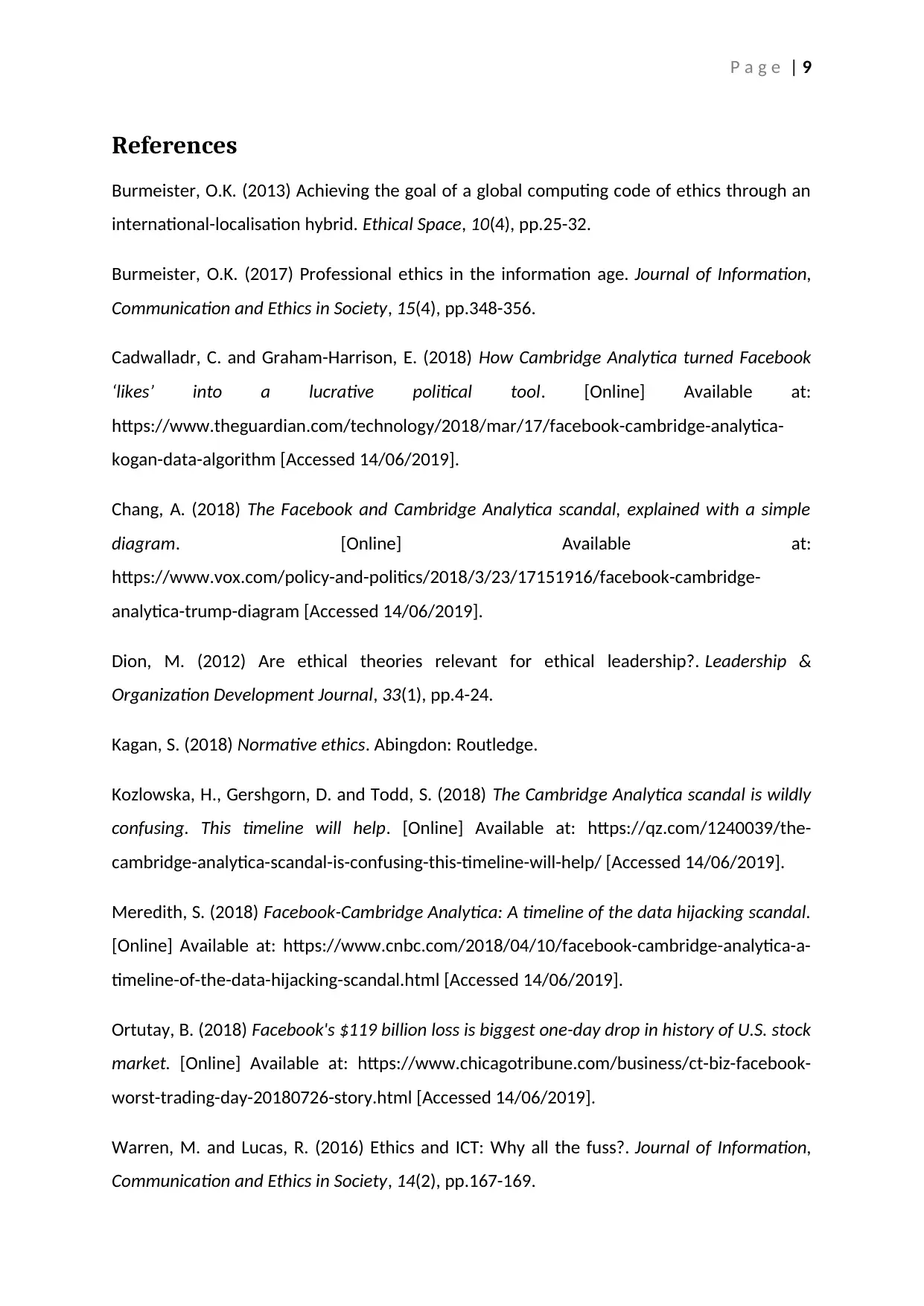
P a g e | 9
References
Burmeister, O.K. (2013) Achieving the goal of a global computing code of ethics through an
international-localisation hybrid. Ethical Space, 10(4), pp.25-32.
Burmeister, O.K. (2017) Professional ethics in the information age. Journal of Information,
Communication and Ethics in Society, 15(4), pp.348-356.
Cadwalladr, C. and Graham-Harrison, E. (2018) How Cambridge Analytica turned Facebook
‘likes’ into a lucrative political tool. [Online] Available at:
https://www.theguardian.com/technology/2018/mar/17/facebook-cambridge-analytica-
kogan-data-algorithm [Accessed 14/06/2019].
Chang, A. (2018) The Facebook and Cambridge Analytica scandal, explained with a simple
diagram. [Online] Available at:
https://www.vox.com/policy-and-politics/2018/3/23/17151916/facebook-cambridge-
analytica-trump-diagram [Accessed 14/06/2019].
Dion, M. (2012) Are ethical theories relevant for ethical leadership?. Leadership &
Organization Development Journal, 33(1), pp.4-24.
Kagan, S. (2018) Normative ethics. Abingdon: Routledge.
Kozlowska, H., Gershgorn, D. and Todd, S. (2018) The Cambridge Analytica scandal is wildly
confusing. This timeline will help. [Online] Available at: https://qz.com/1240039/the-
cambridge-analytica-scandal-is-confusing-this-timeline-will-help/ [Accessed 14/06/2019].
Meredith, S. (2018) Facebook-Cambridge Analytica: A timeline of the data hijacking scandal.
[Online] Available at: https://www.cnbc.com/2018/04/10/facebook-cambridge-analytica-a-
timeline-of-the-data-hijacking-scandal.html [Accessed 14/06/2019].
Ortutay, B. (2018) Facebook's $119 billion loss is biggest one-day drop in history of U.S. stock
market. [Online] Available at: https://www.chicagotribune.com/business/ct-biz-facebook-
worst-trading-day-20180726-story.html [Accessed 14/06/2019].
Warren, M. and Lucas, R. (2016) Ethics and ICT: Why all the fuss?. Journal of Information,
Communication and Ethics in Society, 14(2), pp.167-169.
References
Burmeister, O.K. (2013) Achieving the goal of a global computing code of ethics through an
international-localisation hybrid. Ethical Space, 10(4), pp.25-32.
Burmeister, O.K. (2017) Professional ethics in the information age. Journal of Information,
Communication and Ethics in Society, 15(4), pp.348-356.
Cadwalladr, C. and Graham-Harrison, E. (2018) How Cambridge Analytica turned Facebook
‘likes’ into a lucrative political tool. [Online] Available at:
https://www.theguardian.com/technology/2018/mar/17/facebook-cambridge-analytica-
kogan-data-algorithm [Accessed 14/06/2019].
Chang, A. (2018) The Facebook and Cambridge Analytica scandal, explained with a simple
diagram. [Online] Available at:
https://www.vox.com/policy-and-politics/2018/3/23/17151916/facebook-cambridge-
analytica-trump-diagram [Accessed 14/06/2019].
Dion, M. (2012) Are ethical theories relevant for ethical leadership?. Leadership &
Organization Development Journal, 33(1), pp.4-24.
Kagan, S. (2018) Normative ethics. Abingdon: Routledge.
Kozlowska, H., Gershgorn, D. and Todd, S. (2018) The Cambridge Analytica scandal is wildly
confusing. This timeline will help. [Online] Available at: https://qz.com/1240039/the-
cambridge-analytica-scandal-is-confusing-this-timeline-will-help/ [Accessed 14/06/2019].
Meredith, S. (2018) Facebook-Cambridge Analytica: A timeline of the data hijacking scandal.
[Online] Available at: https://www.cnbc.com/2018/04/10/facebook-cambridge-analytica-a-
timeline-of-the-data-hijacking-scandal.html [Accessed 14/06/2019].
Ortutay, B. (2018) Facebook's $119 billion loss is biggest one-day drop in history of U.S. stock
market. [Online] Available at: https://www.chicagotribune.com/business/ct-biz-facebook-
worst-trading-day-20180726-story.html [Accessed 14/06/2019].
Warren, M. and Lucas, R. (2016) Ethics and ICT: Why all the fuss?. Journal of Information,
Communication and Ethics in Society, 14(2), pp.167-169.
1 out of 10
Related Documents
Your All-in-One AI-Powered Toolkit for Academic Success.
+13062052269
info@desklib.com
Available 24*7 on WhatsApp / Email
![[object Object]](/_next/static/media/star-bottom.7253800d.svg)
Unlock your academic potential
Copyright © 2020–2026 A2Z Services. All Rights Reserved. Developed and managed by ZUCOL.




